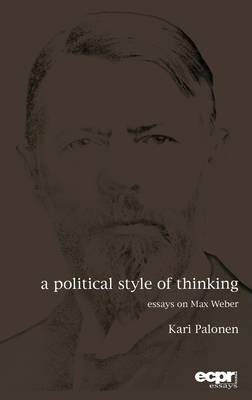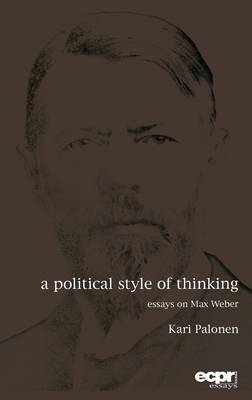
- Afhalen na 1 uur in een winkel met voorraad
- Gratis thuislevering in België vanaf € 30
- Ruim aanbod met 7 miljoen producten
- Afhalen na 1 uur in een winkel met voorraad
- Gratis thuislevering in België vanaf € 30
- Ruim aanbod met 7 miljoen producten
Zoeken
Omschrijving
Max Weber studies have been radically transformed since the 1980s. The author continues this revision by reading Weber as a thoroughly political thinker. Weber's key concept is Chance, a concept that allows us to study politics as contingent activity and to understand both the actions of politicians and the presence of the political aspect in research. This collection contains essays from 1999 to 2014 and a new introduction. The first part deals with Weber's concept of politics and the politician as an ideal type, the second discusses Weber's reinterpretations of key political concepts of freedom, democracy, parliament, nation and the state. The third part links Weber's concept of 'objectivity' with the parliamentary style of politics. The essays set Weber's political thought in relationship to his predecessors (Constant, Bagehot, Nietzsche), contemporaries (Sombart, Schmitt, Benjamin), later (Arendt, Sartre) or contemporary scholars (Skinner, Koselleck) and current Weber studies (Hennis, Scaff, Ghosh).
Specificaties
Betrokkenen
- Auteur(s):
- Uitgeverij:
Inhoud
- Aantal bladzijden:
- 236
- Taal:
- Engels
Eigenschappen
- Productcode (EAN):
- 9781785522659
- Verschijningsdatum:
- 8/12/2016
- Uitvoering:
- Hardcover
- Formaat:
- Genaaid
- Afmetingen:
- 156 mm x 234 mm
- Gewicht:
- 508 g

Alleen bij Standaard Boekhandel
+ 248 punten op je klantenkaart van Standaard Boekhandel
Beoordelingen
We publiceren alleen reviews die voldoen aan de voorwaarden voor reviews. Bekijk onze voorwaarden voor reviews.







